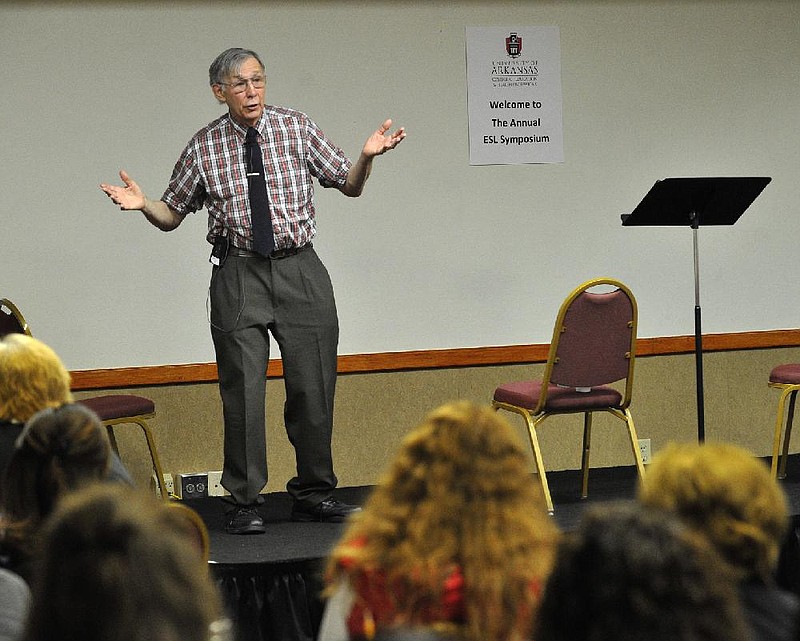FAYETTEVILLE — An adviser to the popular children’s show Dora the Explorer can relate to the cultural tensions that face children of immigrant families.
Carlos Cortes, 78, creative and cultural adviser for the animated series about a bilingual girl, is the son of a Mexican Catholic father and a white Jewish mother. When he entered the eighth grade in Kansas City, Mo., in the 1940s, he struggled to belong.
The Christian clubs at school didn’t accept him because his mother was Jewish. Her parents immigrated to Kansas City, Mo., from Ukraine and Austria.
The Jewish clubs wouldn’t take him because his father was Catholic.
Even though his adolescence was decades ago, Cortes’ story still resonates with the cross-cultural journey of children who speak other languages. Educators from Northwest Arkansas see the tension children face as they try to fit in with the American culture at school and at the same time respect and maintain the cultural traditions of their parents.
Cortes told of his personal experiences through a play he wrote and performed Friday for nearly 200 teachers attending the fifth annual University of Arkansas English-as-a-second-language symposium at the Guesthouse Inn in Fayetteville.
Cortes based his one-man play Conversations with Alana: One Boy’s Multicultural Rite of Passage on a book he wrote about his family history, Rose Hill: An Intermarriage Before Its Time. He cast the play like as if he is telling his family’s story to his then-15-year-old daughter, Alana, represented by a vacant chair.
During part of his performance, he tells of how a family trip to Mexico led his father to teach Cortes more about his Mexican heritage.His dad, also Carlos Cortes, read him stories night after night about the Aztecs, bullfighting and Mexican art and literature.
Cortes’ dad also started teaching him more Spanish. His mom and grandparents had taught him Yiddish.
“At home, especially during family arguments, English would sometimes disappear entirely, replaced by Spanish and Yiddish. Side-by-side conversations and I would be the only one who could understand both of them. Imagine our dinner table, me trying to eat dessert while Grandma and Granddad and Dad are running each other down.”
Cortes’ dad began taking him to Mass, though with a warning not to tell his mother. His mother had taken him to Jewish school at a local temple. When it came time to join the Boy Scouts, his mother preferred that he join a Jewish troop, but his dad prevailed with him joining a troop at a local church.
He was caught between them until his parents made a compromise. His dad would raise him as a Mexican, and his mom would raise his younger brother as a Reform Jew.
At school in the eighth grade, he faced rejection; because of his mixed background, he didn’t fit into any one group, he said. In ninth grade, he was enrolled in private school, adding social class to the mix of racial and religious differences.
Cortes left Kansas City after high school and went to college in California. His first year, he hid the Jewish part of his past. His second year, though, he began to tell of his Jewish heritage.
The experience was challenging, but as an adult, Cortes realized how lucky he was to have the heritage he did, he said.
In Farmington, about 90 students are in English-as-asecond language programs,said Lynn Faught, the district coordinator for the program and teacher for all 2,300 students in kindergarten through 12th grade. Most of the students speak Spanish, but some are Saudi Arabian, Chinese and Marshallese.
Faught is not aware of any students facing all of the tensions Cortes faced, but she sees how torn they are between their parents’ culture and the culture they see at school, Faught said. Many parents want their children to learn English and think that by not speaking Spanish at home they are helping their children learn English.
“They’re not proficient in Spanish or their native language and they’re not proficient in English,” she said. “They’re not strong in any language.”
In some cases, a language barrier develops between the parents and children so that they have a hard time communicating with each other, Faught said.
“It’s just sad to me,” she said.
Cortes’ story can help teachers appreciate the experience of a child whose home culture differs from the predominant culture at school, said Janet Penner-Williams, UA assistant dean of academic affairs, who was involved in organizing the symposium. Those experiences cross generations.
“There’s still that feeling that they don’t know what is expected of them,” Penner-Williams said. “They want to please. They may not understand what the teacher is asking them to do.”
But when teachers understand the cultural differences, they can relate better to their students and build a relationship with them that allows their learning to progress, she said.
Cortes is a retired history professor from the University of California at Riverside. He reads the scripts for Dora the Explorer to ensure the show doesn’t distort Hispanic culture, and that it presents Spanish as not merely a translation for English words, but as a valid, authentic language. Dora is bilingual and will repeat phrases and words in English and Spanish.
Dora acts as a role model for a society of many cultures, he said.
“Language is fun,” he said. “Learning about different cultures is fun. People ought to be proud of being bilingual or multilingual.”
Northwest Arkansas, Pages 9 on 02/23/2013

